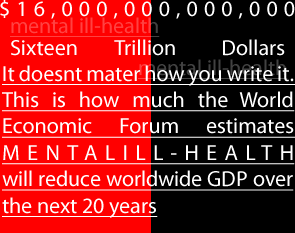 What would you say if I told you that the World Economic Forum had identified something as the biggest threat to economic productivity and that this ‘thing’ is estimated to reduce worldwide GDP by 16 trillion dollars over the next 20 years? Would you be surprised to learn that this entity is estimated to be twice as damaging to the world economy as all forms of cancer combined?
What would you say if I told you that the World Economic Forum had identified something as the biggest threat to economic productivity and that this ‘thing’ is estimated to reduce worldwide GDP by 16 trillion dollars over the next 20 years? Would you be surprised to learn that this entity is estimated to be twice as damaging to the world economy as all forms of cancer combined?
This ‘thing’ of course is the area in which I, as a psychologist over the past 30 years have plied my trade – it’s mental health or more specifically, mental ill-health. The high prevalence disorders of depression anxiety and substance abuse, typically strikes during the most productive period of life, surfacing during the transition to adulthood. Seventy-five per cent of all psychological problems occur under the age of 25 and, while many recover, the developmental tasks of adolescents are often irretrievably compromised, their life chances damaged, and many end up on a disability pension facing a lifetime of struggle.
Compared to previous generations, today’s young people seem to be experiencing an exceptionally high prevalence of poor mental health. The statistics which some say are conservative, suggest one in four secondary and one in seven primary school students have a diagnosable mental illness with 70% of the girls and 80% of the boys not seeking help. Early assessment, diagnosis and prompt treatment are associated with a much better outcome in the short medium and long term – yet in some instances the delay between onset of symptoms and treatment can be up to 15 years.
The rates are even higher in vulnerable populations such as those young people who are indigenous, homeless, in the juvenile justice system, are LGBTQI, facing the final years of school or are living in rural and remote areas of Australia. Study after study demonstrates that when it comes to coping, resilience and wellbeing, the current generation is worse off than previous ones.
The current health care system is under strain and many youth mental health services are unable to meet the demand. There is a significant, growing and unsustainable burden on the mental health workforce. According to Access Economics, youth mental illness costs Australia $10.6 billion per year. A recent report by the Butterfly Foundation found the total social economic cost of eating disorders in 2012 was $69.7 billion.
Australia, like many other Western nations, has clearly reached a tipping point when it comes to youth mental health. We either have to find an extra $9 billion or find and train more than 9000 new mental health professionals in the next 15 years – a seemingly impossible task.
The Young and Well Cooperative Research Centre believes that the solution to many of these problems lie in the development of a 21st century mental health care system, augmented by technology. The good news is that there has been a proliferation of evidence-based online interventions targeted at young people and developed to encourage wellbeing and help seeking and it is unarguable that Australia has led the world in this area.
Technology, in the form of smartphone apps, web-based programs and wearable devices have been found to be an effective way of appealing to young people because they provide an anonymous, confidential, cheap and engaging service. Research shows that such technology can improve and augment existing assessments, diagnoses and treatments for young people. Online health interventions can also improve wellbeing in schools and the workplace; increasing productivity, reducing absenteeism and increasing retention.
Online health interventions have the potential to reduce the prevalence of mental health disorders by encouraging young people to invest in their wellbeing. In addition, they absorb demand on the ‘high prevalence, low need’ end of the mental health spectrum, and free up face-to-face time for clinicians to work with those at the ‘high need’ end of the scale.
There are however, three main problems in the introduction of technology in to the youth mental health space. Firstly, not all young people and carers know how to navigate the e-mental health landscape; secondly, many organisations lack the knowledge of e-mental health and therefore do not include it in clinical training; and lastly there is little incentive for professionals to refer to e-mental health offerings.
To address these problems, the Young and Well Cooperative Research Centre has created an education and training package designed to revolutionise the delivery of mental health services to young people. The Certificate in Young People’s Mental Health and Technology, designed and delivered in conjunction with Australia’s leading youth mental health agencies and professional organisations, aims to provide Governments, NGO’s, businesses and workers with young people in health, education and welfare with a range of new skills to best equip them to work with young people in the digital age.
It is important to stress that it is not being suggested that technology is a solution in replacement of face-to-face care, rather that it should be integrated with face-to-face care as a means of achieving great impact and gain greater value in an underinvested area – in short, this is way to fix a malfunctioning system.
The certificate offers workers with young people in health, education and welfare the opportunity to consolidate and market their expertise in the area of mental health and technology. It is designed to provide participants with the skills, knowledge and strategies to fully integrate a range of web-based programs, smart phone apps and wearable devices into their professional practice.
It offers an evidence-based curriculum, informed by innovative research by world-leading experts, as well as young people themselves.
The certificate accounts for approximately 28 hours of active (screen-based) professional development, consisting of four online modules of approximately 7 hours per module, plus additional reading and self-study. Enrolment for each module is for a maximum 6-month period, with learning designed to be self-paced with 24-hour access to materials.
The four modules are:
- Introduction to adolescent mental health and technology
- Technology, suicide prevention and self-harm
- Integrating technology in professional practice
- Legal and ethical issues in technology in professional practice
The content includes demonstrations of how to use evidence-based web programs and apps to treat anxiety, depression and substance abuse, how to use YouTube therapeutically, apps to address medication-compliance, digital safety plans, mindfulness, self-harm, and OCD. A major component of the course is aimed at training workers to use apps to help young people manage their own wellbeing, thus preventing the development of more serious psychological problems.
Modules may be taken separately but there is normally a recommended order or sequence for enrolment. All courses contain practice quizzes and a final assessment. Certificates of completion are issued on successful completion of the final assessment for each module and a full certificate is awarded following successful completion of all four course components. Each module costs $250 and the full certificate will be $1,000.
With the certificate preparing to launch in June, expressions of interest can be registered at www.youngandwellcrc.org.au/certificate.
There can be no doubt that by providing this unique opportunity to workers with young people in health, education and welfare the Young and Well Cooperative Research Centre is playing a significant part of a much needed revolution in the provision of psychological services to young people and that future generations will be psychologically better off as a result. We must never lose sight of the fact that while young people may comprise just 16% of the population that they are 100% of our future.


